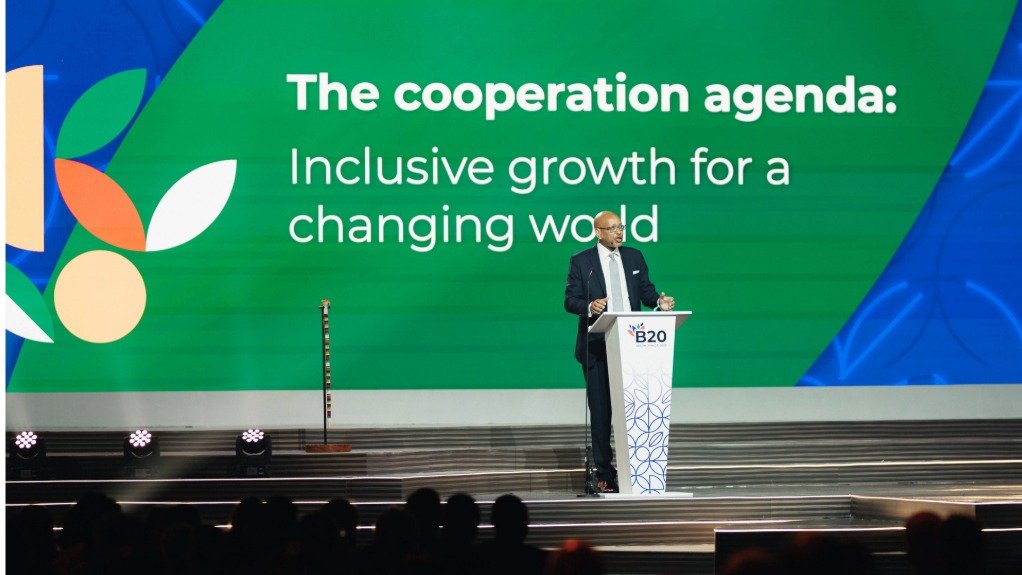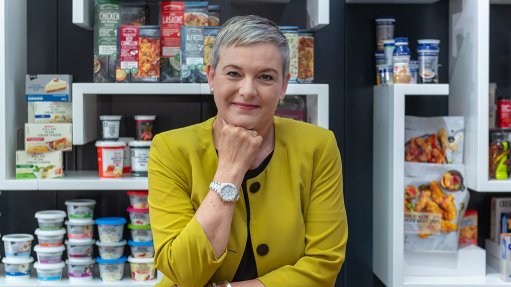B20 calls for cooperation to create sustainable jobs in Africa


International Finance Corporation Africa VP Ethiopis Tafara delivering the keynote address at the B20
Photo by RTC Studio
Creating jobs and promoting shared prosperity requires cooperation and, by mobilising all resources and acting collectively, the challenge of low employment can be turned into opportunity, engendering an inclusive and sustainable financial future for Africa.
This was indicated by World Bank Group member International Finance Corporation (IFC) Africa VP Ethiopis Tafara in his keynote address, delivered on the second day of the Business 20 (B20) Summit, in Sandton, South Africa.
The B20 South Africa 2025 Summit is being held - for the first time in Africa - as part of South Africa’s G20 presidency.
In her welcoming remarks, B20 co-chairperson Nonkululeko Nyembezi underscored the significance of the occasion, noting that G20 economies generated upwards of 80% of global GDP and 90% of global employment.
The B2O, a substream of the G20, brings together global business leaders, policymakers and partners for three days of dialogue, debate and collaboration.
In his keynote address, 'The Cooperation Agenda: Inclusive Growth For A Changing World' Tafara highlighted that while the state of development partnership currently appeared chaotic, there was a lot of potential, with central themes emerging from the apparent discordance.
He pointed out that the work of the B20 was closely aligned with the IFC’s core mission to create vibrant private sectors in emerging markets, including in Africa.
Tafara highlighted that the IFC was optimistic, with “remarkable dynamism” evident across the continent.
“The private sector is emerging as a leading driver of progress. We see thriving digital economies in Kenya and Nigeria. We see green industrial corridors are taking shape in South Africa and Morocco. We see agribusiness transformation, powered by technology and value addition. We see healthcare innovations from Nairobi to Lagos, and from Cairo to Kigali. And we see a surge in renewable-energy investments, enabled by supportive policy frameworks,” he acclaimed.
However, Tafara cautioned that this momentum was not without challenges, including global shocks and tightening fiscal space, as well as lack of access to energy. Moreover, the world was battling multiple and overlapping catastrophes, and was grappling with the far-reaching consequences of war.
“We all know it is impossible for national governments in the public sector to solve these daunting problems on their own, and close the $2.5-trillion financing gap to achieve the UN Sustainable Development Goals,” Tafara averred, positing that this meant that the private sector was required.
He called for the public sector and the private sector to collaborate, with the multilateral community to play a role in enabling this.
“The urgency is real. More than 12-million young people enter the job market every year, yet we only create three-million jobs per year, he warned.
Tafara emphasised that creating jobs, mobilising local savings and attracting international capital were both an economic imperative and a pressing social need.
“Mobilising all resources, savings, regional markets and strategic international investments is the key to sustainable growth,” he emphasised.
ACTIONS
Tafara explained that the World Bank Group’s goal of job creation was hinged on three pillars, namely investing in infrastructure and human capital, reforming regulatory frameworks to foster entrepreneurship, and mobilising the private sector at scale.
Within the first pillar, the group is undertaking the Mission 300 initiative along with the African Development Bank, which aims to provide electricity to 300-million Africans by 2030.
It has also launched Agri Connect, which is aimed at transforming small-scale agriculture into a driver of sustainable growth, jobs and food security.
Tafara informed that Word Bank Group president Ajay Banga had announced his intention to double commitments in agribusiness to $9-billion a year by 2030.
In the second pillar, the World Bank used its expertise and advisory programmes to assist countries with building stable and transparent frameworks, Tafara said.
He averred that the group’s Joint-Capital Market Programme had helped prepare 55 laws and regulations across 20 countries, and mobilised $17-billion in private investments since 2018, including over $7-billion in Africa.
Tafara said the group’s role for the third pillar was to turn constraints into levers.
“We’re moving from an originate-to-hold model to an originate-to-distribute model, where projects are designed from the outset to create markets, attract the diversity of investors and mobilise private capital at a new scale, notably through securitisation.
“We now offer our clients a unique and comprehensive package of guarantees tailored to their specific needs and risk profiles. We’re also developing local currency financing to strengthen resilience, support small- and medium-sized enterprises . . . and help more mature companies scale up, as we have done in the digital and connectivity sectors. And we are scaling up our equity investments . . .” he highlighted.
Tafara said success would depend on everyone and, in this vein, called on regulators to foster innovation while preserving stability; financial institutions to offer products adapted to local needs; public decision-makers to accelerate the development of capital markets; and investors to fully recognise Africa’s potential.
“Above all, we must act with urgency, dictated by our youth,” Tafara emphasised.
In a panel discussion building on the keynote: 'Global South and Global North Conversation: Getting Global Cooperation Right in the Next Era of Global Change', some of the key messages that emerged included that despite challenges such as countries having to navigate geopolitical complexities and political divisions, there was the opportunity to use this to have frank discussions and find a way to collaborate for a better future, one which allows Africa to harness it resources for the surrounding communities.
Climate change and digitalisation would also require new approaches, with the latter requiring the reskilling and upskilling of people for the new world of work, to ensure that jobs were not lost.
There was also the need to enhance the sustainability of enterprises and the productivity that emerged from these, as without this, the status quo of a large percentage of youth being unemployed would persist.
Article Enquiry
Email Article
Save Article
Feedback
To advertise email advertising@creamermedia.co.za or click here
Announcements
What's On
Subscribe to improve your user experience...
Option 1 (equivalent of R125 a month):
Receive a weekly copy of Creamer Media's Engineering News & Mining Weekly magazine
(print copy for those in South Africa and e-magazine for those outside of South Africa)
Receive daily email newsletters
Access to full search results
Access archive of magazine back copies
Access to Projects in Progress
Access to ONE Research Report of your choice in PDF format
Option 2 (equivalent of R375 a month):
All benefits from Option 1
PLUS
Access to Creamer Media's Research Channel Africa for ALL Research Reports, in PDF format, on various industrial and mining sectors
including Electricity; Water; Energy Transition; Hydrogen; Roads, Rail and Ports; Coal; Gold; Platinum; Battery Metals; etc.
Already a subscriber?
Forgotten your password?
Receive weekly copy of Creamer Media's Engineering News & Mining Weekly magazine (print copy for those in South Africa and e-magazine for those outside of South Africa)
➕
Recieve daily email newsletters
➕
Access to full search results
➕
Access archive of magazine back copies
➕
Access to Projects in Progress
➕
Access to ONE Research Report of your choice in PDF format
RESEARCH CHANNEL AFRICA
R4500 (equivalent of R375 a month)
SUBSCRIBEAll benefits from Option 1
➕
Access to Creamer Media's Research Channel Africa for ALL Research Reports on various industrial and mining sectors, in PDF format, including on:
Electricity
➕
Water
➕
Energy Transition
➕
Hydrogen
➕
Roads, Rail and Ports
➕
Coal
➕
Gold
➕
Platinum
➕
Battery Metals
➕
etc.
Receive all benefits from Option 1 or Option 2 delivered to numerous people at your company
➕
Multiple User names and Passwords for simultaneous log-ins
➕
Intranet integration access to all in your organisation



















